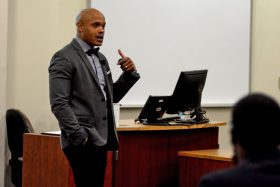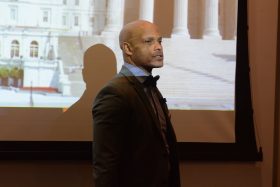Attorney Toussaint Romain established a national reputation for his community activism following a police shooting in North Carolina, and in remarks delivered as part of Elon Law’s 2019 Inclusion Week, he implored students to use their legal education to confront the institutional racism embedded in society.

And what would it look like had a President Frederick Douglas been assassinated for freeing white people with the encouragement of famed abolitionists like Abraham Lincoln?
And what would it look like had white people, for the better part of a century, been terrorized with “Tim Crow” laws and lynchings not by the Ku Klux Klan, but rather by a hooded Wu Tang Clan?
And even after the passage of civil rights laws and Supreme Court decisions that affirmed the right of white people to take part in all facets of society, what would it look like for whites to still be “dirt poor” with a criminal justice system stacked against them?
Inverting racial treatment throughout American history served as the backdrop to a Monday presentation at Elon Law led by an attorney and civil rights activist who gained attention in 2016 for his role as a peacekeeper during the riots following a police shooting.
Toussaint Romain, a former public defender, delivered his talk – “What if Kanye West Were President? Law Students & Systemic Legal Reform” – on the opening night of Elon Law’s 2019 Inclusion Week. Romain was invited by James Harris L’19 on behalf of Elon Law’s First-Generation Legal Professionals & Allies.
Among Romain’s key points: Whites shouldn’t be weighed down by a sense of “white guilt” and blacks shouldn’t assume that a white person is inherently racist. Instead, find common ties and common interests. Creating relationships based on trust can lead to successful efforts to break down institutional racism that remains in systems of justice and government policies.
 “What can you do that’s going to make people want to get behind you to change the very beliefs that they have?” Romain said. “One person can make a difference. Everyone should try.
“What can you do that’s going to make people want to get behind you to change the very beliefs that they have?” Romain said. “One person can make a difference. Everyone should try.
“We live in a system that was built a long time ago,” he added moments later. “We’ve got to fix it. We’ve got to improve it.”
Elon Law’s annual Inclusion Week runs Feb. 18-23, 2019, where programs for the law school community explore and foster dialogue about diversity and inclusion in the American legal profession.
The American Bar Association Center for Racial and Ethnic Diversity and the ABA Young Lawyers Division honored Elon Law’s inaugural Diversity Week programming five years ago when it finished first in their Next Steps Diversity Challenge.
Romain said Elon Law students have a particular responsibility to act as leaders in the ongoing quest for equity and justice.
“How are you using your privilege? Because in case you haven’t realized it, to be a law student is a very privileged opportunity,” he said. “And once you graduate and become lawyers, everyone’s going to look to you for the answers. So be the answer.”


